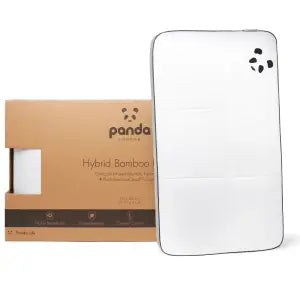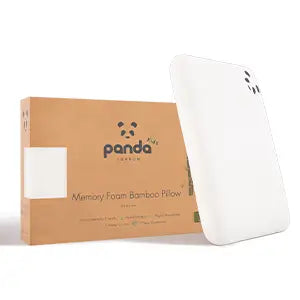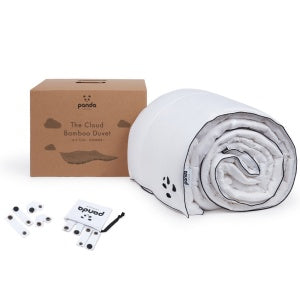We all dream of closing our eyes and drifting off within minutes. But for many, it takes much longer than that. In fact, our sleep study from 2022 suggests that more than 40% of young adults spend over half an hour trying to fall asleep. The truth? What you do before bedtime plays a big role in how quickly and soundly you fall asleep. Let’s explore the best and worst things to do before bed — updated with the latest research and expert advice.
The Best Things To Do Before Bed
1. Take a warm bath or shower
Science backs this classic ritual. A meta-analysis of 17 studies found that a warm bath or shower about 1–2 hours before bed helps you fall asleep faster. The warm water raises your body temperature, and the cooldown afterwards signals to your body that it’s time for rest. Add lavender oils or Epsom salts for extra relaxation, and wrap up in soft, breathable bamboo towels for that spa-like finish.
2. Listen to calming sounds
White, pink, or brown noise can mask environmental disturbances and ease a restless mind. Studies show they may help people fall asleep up to 38% faster. Whether it’s rain sounds, gentle waves, or a soothing bedtime story, experiment to see what works best for you. For some, even guided meditation apps or ASMR can do the trick.
3. Create a bedtime routine
Consistency is key. Going to bed and waking up at the same time—even on weekends—helps regulate your circadian rhythm. Build a calming ritual, like reading, journaling, or slipping on a bamboo eye mask while you sip a bedtime tea. Over time, your body will naturally associate these cues with winding down.
4. Practice relaxation techniques
Breathing practices like the 4-7-8 method or progressive muscle relaxation calm the nervous system. By slowing your breath and releasing tension, you make it easier for your mind and body to slip into sleep mode. Many sleep specialists now recommend incorporating these techniques daily.

The Worst Things To Do Before Bed
1. Scrolling on your phone
We all know it, yet we do it. The blue light from phones and laptops suppresses melatonin, delaying sleep. On top of that, the endless content—emails, social feeds, and TikToks—keeps your brain wired. Experts now recommend a strict digital curfew: put your devices away at least one hour before bed. Swap the screen time for a book, light stretching, or pillow talk.
2. Drinking caffeine too late
That afternoon coffee might be sabotaging your sleep. Caffeine can linger in your system for up to 8 hours, promoting alertness long after you’ve finished your cup. Swap late-day coffee for a herbal tea or warm milk if you want a smoother path to sleep.
3. Heavy or late-night meals
Spicy curries or late desserts might be tasty, but they raise body temperature and can trigger indigestion. Both make it harder to fall asleep comfortably. Aim to finish your last meal at least 2–3 hours before bedtime.
4. Drinking alcohol
While it may feel like alcohol helps you fall asleep, it actually disrupts REM sleep, making you more likely to wake up during the night. Experts suggest limiting nightcaps to ensure deeper, restorative rest.
5. Using the wrong bedding
Your bedding plays a bigger role in sleep than you think. Overheating is one of the most common causes of restless nights. Experts recommend breathable, moisture-wicking fabrics to help regulate body temperature. Our bamboo bedding range is thermoregulating, hypoallergenic, and silky soft—helping you stay cool and comfortable all night long.
How To Improve Your Sleep Routine
Creating a sleep-friendly lifestyle doesn’t need to feel overwhelming. Small changes can have a big impact:
- Set a bedtime schedule. Stick to the same sleep and wake times daily.
- Make your room sleep-friendly. Keep it dark, quiet, and cool (ideally 18°C).
- Move during the day. Regular exercise supports deeper sleep.
- Try mindfulness. Journaling, meditation, or visualisation can help calm racing thoughts.
Sleep is deeply personal—what works for one person may not work for another. The key is experimenting with good habits while cutting out the sleep saboteurs.
Sweet Dreams Start with Small Changes
Your bedtime choices shape your nights and mornings. From warm baths to calming sounds, bamboo bedding to breathing techniques, a few mindful swaps can make all the difference. So tonight, ditch the scrolling, brew a soothing tea, and create the restful environment your body and mind deserve. Because better sleep doesn’t just happen—it’s something you build, one good habit at a time.
FAQ
1. What are the best things to do before bed for better sleep?
The best bedtime habits include taking a warm bath, listening to relaxing sounds, and following a consistent sleep routine. These activities calm your body and mind, helping you drift off faster.
2. What are the worst things to do before going to sleep?
The worst bedtime habits include scrolling on your phone, drinking caffeine late, and using heavy or non-breathable bedding. These can delay sleep and reduce sleep quality.
3. How does screen time affect sleep before bed?
Using phones, tablets, or laptops before bed exposes you to blue light, which reduces melatonin levels and keeps your brain alert. This makes it harder to fall asleep.
4. Can what you eat or drink before bed affect sleep quality?
Yes—caffeine, alcohol, and heavy meals close to bedtime can keep you awake. Instead, choose calming drinks like herbal tea or warm milk to prepare your body for rest.
5. How can I improve my bedtime routine for deeper sleep?
You can improve your bedtime routine by setting a consistent sleep schedule, creating a relaxing environment, and using breathable bedding that regulates body temperature.

![[MattressTopper] Panda London Memory Foam Bamboo Mattress Topper package box](http://pandalondon.com/cdn/shop/files/Bamboo_Mattress_Topper_Package_Box.webp?v=1742301823&width=1500)
![[MattressTopper] Panda London Memory Foam Bamboo Mattress Topper on the floor](http://pandalondon.com/cdn/shop/products/Panda-Memory-Foam-Bamboo-Mattress-Topper-Yoga-e1624045454555.jpg?v=1742301823&width=1000)
![[MattressTopper] Bamboo Mattress Topper Lifestyle Image with Memory Foam Pillows Product Page](http://pandalondon.com/cdn/shop/files/Bamboo_Mattress_Topper_Lifestyle_Image_with_Memory_Foam_Pillows_Product_Page.webp?v=1742301823&width=800)
![[MattressTopper] Bamboo Mattress Topper Lifestyle Image with Bamboo Pillows In the Garden room Product Page](http://pandalondon.com/cdn/shop/files/Bamboo_Mattress_Topper_Lifestyle_Image_with_Bamboo_Pillows_In_the_Garden_room_Product_Page.webp?v=1752572859&width=800)
![[MattressTopper] Panda London Memory Foam Bamboo Mattress Topper side](http://pandalondon.com/cdn/shop/files/Mattress_Topper_Isolated_-_resized.jpg?v=1752572859&width=800)
![[HybridMattressPro] Main Image for Hybrid Bamboo Mattress Pro with all awards](http://pandalondon.com/cdn/shop/files/Hybrid_Bamboo_Mattress_Pro_Main_product_Image_with_awards.webp?v=1753971649&width=1000)
![[HybridMattressPro] Breathable Hybrid Bamboo Mattress](http://pandalondon.com/cdn/shop/products/Breathable-Hybrid-Bamboo-Mattress.jpg?v=1753971649&width=1920)
![[HybridMattressPro] Hybrid Bamboo Mattress Pro Cover Zip](http://pandalondon.com/cdn/shop/files/Hybrid_Bamboo_Mattress_Cover.jpg?v=1753971649&width=800)
![[HybridMattressPro] Panda Hybrid Bamboo Mattress Pro](http://pandalondon.com/cdn/shop/files/Hybrid_Bambo_Memory_Foam_Mattress_-_BioCell_Foam_x.jpg?v=1755095108&width=800)
![[HybridMattressPro] Couple on a Hybrid Bamboo Mattress Pro](http://pandalondon.com/cdn/shop/files/Hybrid_Bamboo_Mattress_Couple.jpg?v=1753971649&width=800)
![[CloudDuvet] Panda London The Cloud Bamboo Duvet Packaging](http://pandalondon.com/cdn/shop/products/Panda-London-The-Cloud-Bamboo-Duvet-Panda-Life-scaled_00a651ad-4ca3-4105-b520-12a94c1a4f71.jpg?v=1713363286&width=1920)
![[CloudDuvet] Panda London The Cloud Bamboo Duvet Rolled](http://pandalondon.com/cdn/shop/products/Duvet-Listing-Images03.jpg?v=1713361452&width=1000)
![[CloudDuvet] Panda London The Cloud Bamboo Duvet Girl Huggin a Duvet on the Bed](http://pandalondon.com/cdn/shop/files/Cloud_Bamboo_Duvet_-_Lady_Hugging_it_on_Bed_LifestyleImage.jpg?v=1719327585&width=1000)
![[CloudDuvet] Panda London The Cloud Bamboo Duvet Guy In the Air with Cloud Bamboo Duvet](http://pandalondon.com/cdn/shop/files/GuyonaHybridBambooMattresswithCloudDuvet.jpg?v=1743097928&width=2000)
![[CloudDuvet] Panda Cloud Duvet Winter on the bed lifestyle image](http://pandalondon.com/cdn/shop/files/Panda_Cloud_Duvet_Winter_on_the_Bed_Lifestyle-1_image.jpg?v=1747994959&width=1000)
![[BBWhite] White 100% Bamboo Bedding](http://pandalondon.com/cdn/shop/files/Pure_White_Full_Bed.webp?v=1719581797&width=1000)
![[BBWhite] White 100% Bamboo Bedding Texture](http://pandalondon.com/cdn/shop/files/100_Bamboo_Bedding_-_Pure_White_-_Close_Up_02.webp?v=1719581781&width=1000)
![[BBWhite] White 100% Bamboo Bedding Woman in bed sleeping](http://pandalondon.com/cdn/shop/files/100-Bamboo-Bedding-Set-Pure-White-BB.webp?v=1719581846&width=768)
![[BBWhite] White 100% Bamboo Bedding Woman Duvet cover buttons](http://pandalondon.com/cdn/shop/files/hand_and_buttons_1.webp?v=1719581781&width=1000)
![[BBWhite] White 100% Bamboo Bedding Woman in bed looking and smiling-](http://pandalondon.com/cdn/shop/files/SatonMadeBed-White100_BambooBedding-white_-_BB_SideShot1000x1000.webp?v=1719581864&width=980)
![[BBUrbanGrey] Urban Grey 100% Bamboo Bedding](http://pandalondon.com/cdn/shop/files/Made_Bed_-_Urban_Grey_-_Wide_Shot_2_1_1.webp?v=1754572609&width=1000)
![[BBUrbanGrey] Cloud Duvet Urban Grey 100% Bamboo Bedding Set](http://pandalondon.com/cdn/shop/files/Cloud_Duvet_-_Grey_-_Close_up_2.webp?v=1754572609&width=1000)
![[BBUrbanGrey] Urban Grey 100% Bamboo Bedding Set Woman sitting on the bed](http://pandalondon.com/cdn/shop/files/Sat_in_Bed_-_Grey_100__Bamboo_Bedding_-_Wide_Shot.webp?v=1754572609&width=1000)
![[BBUrbanGrey] Urban Grey 100% Bamboo Bedding Set Woman Duvet buttons Panda London](http://pandalondon.com/cdn/shop/files/hand_buttons_grey_bedding_1.webp?v=1754572609&width=1000)
![[BBUrbanGrey] Woman Sitting on the Bamboo Bedding with coffee](http://pandalondon.com/cdn/shop/files/SatonMadeBed-White100_BambooBedding-SideShot1000x1000.jpg?v=1754572609&width=1000)
![[BBNavyBlue] Deep Sea Navy Blue 100% Bamboo Bedding](http://pandalondon.com/cdn/shop/files/Made_Bed_-_Navy_-_Wide_Shot_3_copy.webp?v=1754576637&width=1000)
![[BBNavyBlue] Deep Sea Navy Blue 100% Bamboo Bedding Texture](http://pandalondon.com/cdn/shop/files/Cloud_Duvet_-_Navy_-_Close_up_2.webp?v=1754576637&width=1000)
![[BBNavyBlue] Deep Sea Navy Blue 100% Bamboo Bedding Woman Sitting on the bed](http://pandalondon.com/cdn/shop/files/Sat_Up_in_Bed_-_Navy_100__Bamboo_Bedding_-_Hands_on_Bed.webp?v=1754576637&width=1000)
![[BBNavyBlue] Deep Sea Navy Blue 100% Bamboo Bedding Duvet Cover Buttons](http://pandalondon.com/cdn/shop/files/Cloud_Duvet_Cover_Buttons_-_Deep_Sea_Navy.webp?v=1754576637&width=1000)
![[BBNavyBlue] Deep Sea Navy Blue 100% Bamboo Bedding Woman sitting on the bed looking away](http://pandalondon.com/cdn/shop/files/SatonMadeBed-White100_BambooBedding-SideShot1000x1000-001.webp?v=1754576652&width=980)
![[BBPink] Vintage Pink Blue 100% Bamboo Bedding](http://pandalondon.com/cdn/shop/files/Made_Bed_-_Pink_-_Wide_Shot_copy.webp?v=1754576652&width=1000)
![[BBPink] Vintage Pink Texture 100% Bamboo Bedding](http://pandalondon.com/cdn/shop/files/Cloud_Duvet_-_Pink_-_Close_up_2.webp?v=1754576652&width=1000)
![[BBPink] Vintage Pink Woman Sitting on the 100% Bamboo Bedding](http://pandalondon.com/cdn/shop/files/Sat_Up_in_Bed_-_Pink_-_Hands_on_Bed.webp?v=1754576652&width=1000)
![[BBPink] Vintage Pink Woman Sitting on the 100% Bamboo Bedding Duvet Cover](http://pandalondon.com/cdn/shop/files/Cloud_Duvet_Cover_Buttons_-_Vintage_Pink.webp?v=1754576652&width=1000)
![[BBPink] Vintage Pink Woman Sitting on the 100% Bamboo Bedding Woman looking far away](http://pandalondon.com/cdn/shop/files/SatonMadeBed-White100_BambooBedding-SideShot1000x1000-001_Vintage_Pink.webp?v=1754576652&width=980)
![[BBGrey] Light Grey 100% Bamboo Bedding](http://pandalondon.com/cdn/shop/files/Made_Bedding_in_Bedroom_-_Urban_Grey_-_Wide_Shot.webp?v=1754576637&width=1000)
![[BBGrey] Light Grey 100% Bamboo Bedding texture](http://pandalondon.com/cdn/shop/files/Texture17.webp?v=1754576637&width=1000)
![[BBGrey] Light Grey 100% Bamboo Bedding with Woman smiling](http://pandalondon.com/cdn/shop/files/Sat_Up_in_Bed_-_Grey_-_Hands_on_Bed.webp?v=1754576637&width=1000)
![[BBGrey] Light Grey 100% Bamboo Bedding with Duvet Cover buttons](http://pandalondon.com/cdn/shop/files/Cloud_Duvet_Cover_Buttons_-_Quiet_Grey.webp?v=1754576637&width=1000)
![[BBGrey] Light Grey 100% Bamboo Bedding with Woman smiling and sitting coffee](http://pandalondon.com/cdn/shop/files/SatonMadeBed-White100_BambooBedding-SideShot1000x1000-002-_Grey.webp?v=1754576637&width=980)
 Hybrid Bambuskissen
Hybrid Bambuskissen Memory Foam Bambuskissen
Memory Foam Bambuskissen Memory Foam Bambuskissen für Kinder
Memory Foam Bambuskissen für Kinder Baby Memory Foam Bambuskissen
Baby Memory Foam Bambuskissen Panda Bettdecke Cloud
Panda Bettdecke Cloud Bamboo Summer Duvet
Bamboo Summer Duvet Kinder Cloud Bettdecke
Kinder Cloud Bettdecke
![[HybridPillow] Hybrid Bamboo Pillow - Mattress Campaign](http://pandalondon.com/cdn/shop/products/Hybrid-Bamboo-Pillow-Mattress-Campaign.jpg?crop=region&crop_height=1615&crop_left=152&crop_top=0&crop_width=1615&v=1750023555&width=1920)
![[HybridPillow] Hybrid Pillow with Panda brand marking](http://pandalondon.com/cdn/shop/products/Hybrid-Pillow_8.jpg?v=1750023555&width=1920)
![[HybridPillow] Couples laying on Hybrid Bamboo Pillows](http://pandalondon.com/cdn/shop/files/Hybrid_Bamboo_Pillow_Product.jpg?v=1750023555&width=1000)
![[HybridPillow] Red Hair Girl sleeping on a Hybrid Bamboo Pillow](http://pandalondon.com/cdn/shop/files/Hybrid_Bamboo_Pillow_-_Red_Hair_Girl_Product.jpg?v=1750023555&width=1000)
![[HybridPillow] Guy Hugging Hybrid Bamboo Pillow](http://pandalondon.com/cdn/shop/files/Hybrid-Bamboo-Pillow-Man-holding-the-pillow-1024x1024_jpg.webp?v=1750023555&width=1024)